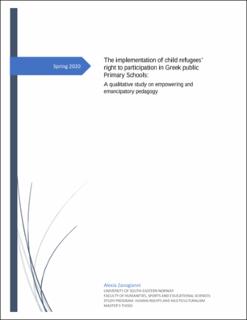| dc.description.abstract | This thesis explores the extent of refugee students’ participation in public Primary schools in Greece, and how their right to be heard is supported. The research question is: To what extent the strategies implemented in Greek Primary schools permit and encourage the child’s right to participation to be enjoyed by refugee students? The main contributors to the project are Lundy and her understanding of Article 12 in education, Rancière and emancipation in education as well as the Freirean critical pedagogy. I conducted my research in two Primary schools in a town in North-West of Greece, and I collected the data through interviews with six refugee students and their teachers, and observations. Many impressive outcomes have occurred, even though the time was limited. The thesis concludes that refugee students’ participation in Greek public Primary schools is limited. Many challenges need to be resolved, such as communication due to children’s low language skills, cases of discrimination and racist behavior between peers, as well as inappropriate pedagogical methods. The study goes further to suggest that reforms in the educational system are necessary to foster refugee students’ right to be heard. Critical and emancipatory pedagogy would be a handy tool since it could change teachers' mindset into one that is more open and willing to support children’s contribution to the teaching process. At the same time, students themselves could benefit and be empowered, taking over control, and gaining confidence. Human rights and multicultural education could also help in the promotion of equality and justice in classrooms, rendering the participation of all students possible, regardless of their needs and competence. Finally, according to the research findings, the conceptualization of the right to participation for refugee children in schools is different than our theory suggests. Lundy focuses on the children’s contribution to decision-making, while in our study, this does not seem relevant. We recommend that participation for refugee students means to fully integrate into the new environment, creating healthy social relationships, and adjusting to the culture of the host country. Adaptation is the first step to the realization of their right to participate, namely, being able to feel accepted by their peers and included in the school activities | en_US |
